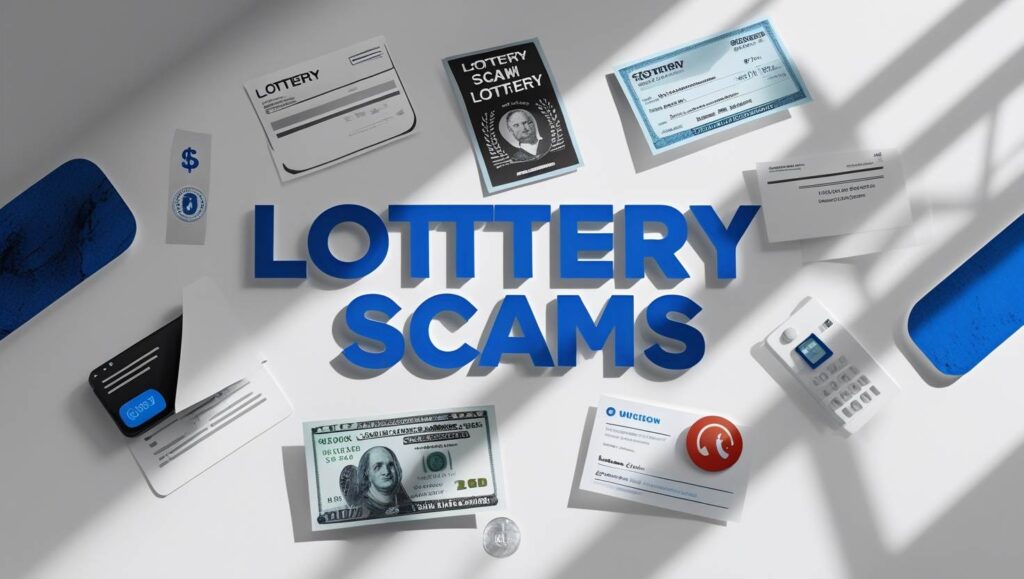
Lottery scams are an ever-present and growing threat in today’s digital landscape. These fraudulent schemes prey on individuals by offering them an enticing chance to win large sums of money, often from lotteries that the victim never even entered. While scams of this nature have been around for decades, their methods have evolved in recent years, growing increasingly sophisticated and more difficult to detect. In a world where digital communication is ubiquitous, scammers now have an unprecedented ability to reach their victims through email, social media, phone calls, and other online platforms.
This comprehensive guide will equip you with the knowledge needed to understand, identify, and protect yourself from lottery scams. Whether you are dealing with a scam directly or simply wish to be more informed, this guide will help you recognize the red flags and take the necessary steps to avoid becoming a victim.
Understanding Lottery Scams

At the core of most lottery scams is the same basic premise: a victim is led to believe that they have won a prize in a lottery that they never entered. The scammer’s ultimate goal is to obtain money or personal information from the victim under the false pretense of processing fees, taxes, or other supposed expenses needed to claim the prize.
These scams typically take on one of several forms, such as fraudulent emails, phone calls, social media messages, and even physical letters. While the method of delivery may vary, the goal is the same: to convince the target that they are the lucky winner of a large cash prize, which they can only claim by providing personal information or making an upfront payment.
In order to appear legitimate, these scams often use language, logos, and branding that closely resemble those of well-known and trusted lottery organizations. This helps to build an illusion of credibility and increases the likelihood of the victim falling for the scam. The scammers might even include official-looking documents and badges, such as the seals of popular lottery companies or government agencies.
Why is it Crucial to Understand Lottery Scams?
The rise of digital communication has led to an explosion in the number of lottery scams, with fraudsters utilizing various online platforms to target potential victims. While this ease of communication has certainly revolutionized how we interact, it has also opened new channels for malicious actors to exploit unsuspecting individuals. Understanding how lottery scams work is more important than ever for the following reasons:
Increased Susceptibility
The proliferation of email, social media, and messaging platforms has made it much easier for scammers to reach vast numbers of potential victims. Unlike traditional scams, which may have required face-to-face interaction or phone calls, today’s scammers can access their targets with just a click of a button, making it all too easy for individuals to fall victim to these deceptive schemes.
More Sophisticated Scams
Modern lottery scams have become more elaborate and convincing. Scammers now have access to advanced tools that allow them to mimic legitimate emails, websites, and phone calls. They may even use sophisticated technology to create fake documents, fake websites, and even spoof phone numbers, making it increasingly difficult to distinguish between a legitimate lottery notification and a scam.
Financial and Emotional Consequences
The consequences of falling victim to a lottery scam can be devastating. Victims may lose a significant amount of money, and in some cases, their personal information could be stolen and used for identity theft. Beyond the financial impact, the emotional toll of being deceived can lead to feelings of stress, anxiety, and embarrassment. Some victims may even experience a loss of trust in others, especially if the scam was perpetrated by someone they knew or trusted.
Global Reach and Challenges for Authorities
Lottery scams are no longer confined to specific geographic regions. With the help of the internet, scammers can now operate globally, targeting individuals across different countries and jurisdictions. This international reach presents significant challenges for law enforcement, as tracking down scammers and holding them accountable becomes a complex task. For many victims, this can lead to feelings of helplessness, as they may never see justice served.
Preventative Measures
By understanding how lottery scams work, individuals can take proactive steps to protect themselves and those they care about. Awareness is key to preventing victimization, as individuals who are educated about the common signs of a scam are less likely to fall for fraudulent schemes. The more people know about the tactics used by scammers, the less effective these scams will become.
Types of Lottery Scams

Lottery scams come in various forms, each utilizing a different method to trick victims. Some common types of lottery scams include:
1. Email Scams
One of the most prevalent forms of lottery scams is through email. Victims may receive an email claiming that they have won a significant sum of money in an overseas lottery. The email often appears to be official, using logos and formal language to make the claim seem legitimate. The recipient is then instructed to provide personal information or pay a fee in order to claim their prize. Of course, once the money is sent, the scammer disappears, and the victim is left empty-handed.
2. Phone Scams
In phone scams, scammers directly call the victim to inform them of their supposed lottery winnings. They might sound official, use high-pressure tactics, and create a false sense of urgency. Victims are then persuaded to send money to cover taxes, fees, or processing costs before they can claim their prize. As with email scams, once the money is paid, the scammer vanishes.
3. Social Media Scams
Scammers may use social media platforms like Facebook, Instagram, or Twitter to reach victims. They often impersonate legitimate organizations or even friends and family members. In these scams, victims are told that they’ve won a lottery, but they must pay fees or provide personal information to claim their prize. These scams can be especially dangerous because they may appear more casual and familiar, making them harder to detect.
4. Letter Scams
Some lottery scams still take the traditional route and involve physical mail. Victims may receive a letter claiming that they have won a prize, along with fake checks or certificates to make the letter appear official. The letter often instructs the recipient to pay taxes or other fees in order to claim the prize. These documents are carefully crafted to look legitimate, which adds an extra layer of deception.
5. SMS and Text Message Scams
SMS scams are similar to email scams, but they are delivered via text message. Victims are informed that they have won a lottery and are instructed to follow a link or call a number to claim their prize. These links may lead to fake websites designed to steal personal information or direct the victim to premium-rate phone numbers where they will incur hefty charges.
6. Phishing Scams
Phishing scams involve the creation of fraudulent websites that mimic legitimate lottery sites. Victims are directed to these fake sites to claim their supposed prize. These websites often ask for personal and financial information, which can then be used for identity theft or fraudulent transactions. Phishing scams can be particularly dangerous as they prey on people’s trust in well-known brands.
7. Advanced Fee Scams
Advanced fee scams are one of the most common types of lottery fraud. In this scam, the victim is told that they need to pay an upfront fee to cover taxes, processing fees, or other costs before they can claim their winnings. Once the fee is paid, the scammer disappears, and the victim is left with nothing.
8. Fake Charity Lotteries
Scammers may also pose as representatives of a charity lottery, asking victims to donate or purchase tickets to win a prize. These scams exploit people’s goodwill and their desire to support a good cause. Victims are often made to believe that their donation is not only helping a worthy cause but also entering them into a chance to win a large prize.
Detecting Lottery Scams

Now that we understand the various types of lottery scams, it is essential to know how to recognize them. Here are several common signs that you may be dealing with a lottery scam:
Unsolicited Contact
If you receive a notification that you’ve won a lottery you never entered, this is a major red flag. Legitimate lotteries do not contact winners through unsolicited emails, phone calls, or messages. Always be suspicious of unsolicited communications claiming you’ve won a prize.
Request for Payment
A legitimate lottery will never require you to pay upfront to claim your prize. Any request for payment, especially before you’ve received any prize, is a clear indication that you’re dealing with a scam. Scammers may ask for money to cover taxes, legal fees, or processing costs, but once you pay, they will vanish with your money.
Sense of Urgency
Scammers often try to pressure victims into acting quickly, claiming that the prize must be claimed within a short time frame or it will be forfeited. This tactic is designed to prevent you from thinking critically and taking the time to verify the legitimacy of the claim.
Poor Grammar and Spelling
One of the easiest ways to spot a scam is by looking for poor grammar and spelling errors. Many scam emails, messages, and letters are riddled with mistakes that legitimate communications from reputable organizations would never have. If you notice these errors, be cautious.
Suspicious Email Addresses
Pay close attention to the email address of the sender. Scammers often use addresses that mimic official ones but contain slight alterations. For example, an email from “lottery@officialsite.com” may be a scam if the legitimate lottery uses “lottery@official.com.” Always double-check the sender’s email address before responding.
Conclusion
In conclusion, understanding, detecting, and evading lottery scams is critical in today’s digital age. The consequences of falling victim to these fraudulent schemes can be severe, both financially and emotionally. By being vigilant and recognizing the warning signs of a scam, you can protect yourself and your loved ones from falling prey to these deceptive tactics.
Additionally, taking proactive steps to verify the legitimacy of any lottery claims and reporting suspected scams to the relevant authorities can help reduce the impact of these crimes. It is important to stay informed, stay cautious, and never hesitate to question the legitimacy of any unsolicited lottery notification you receive.
